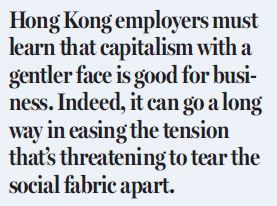Employers should adopt benevolent capitalism
Updated: 2017-02-16 07:31
By Peter Liang(HK Edition)
|
|||||||||
Peter Liang writes it is necessary to persuade HK employers that raising employees' pay can benefit their businesses by creating more potential customers
To many Hong Kong people, the very mention of Kwun Tong conjures up images of narrow streets teeming with trucks and vans loading and unloading goods for the factories in mostly nondescript industrial buildings employing many thousands of workers.
Not anymore.
One of the oldest industrial districts in Hong Kong, Kwun Tong, like the rest of the city, has made the transition to the service economy. The development has been made most obvious by the proliferation of upscale eateries catering to the growing number of high-income white-collar workers.
Along the many streets in the area, some old factory buildings have undergone major remodeling while others have been torn down for redevelopment into office premises. Despite its less-than-ideal location and image problem, Kwun Tong is making noticeable progress in becoming a new business center in the race with other old industrial districts.
The transition of Kwun Tong has often been cited as an example of Hong Kong's success in establishing itself as an international financial center and regional service hub. This is after the wholesale exodus of industry to the Pearl River Delta region in the 1980s. As a result, the services sector, particularly finance and property, now contributes nearly 90 percent of Hong Kong's output.
But the benefit of overdependence on services has been brought into question in recent years by the widening wealth gap. Hong Kong's income disparity, a major source of growing public discontent, is among the highest in developed economies. Public anger has been further fueled by escalating home prices which are seen to have the effect of destroying the middle class who are excluded from a range of government subsidies, including housing.

Talks about reindustrialization with the hope of bringing back well-paid manufacturing jobs have taken on a new dimension since the pronouncement of a similar policy helped US President Donald Trump to win the election last November. Liberal economists in the US wasted no time in shooting down the policy, labeling it unworkable and worse. For Hong Kong, which is a free port with a small domestic market, there is simply no room for manufacturing.
There are still many Hong Kong people who lament the loss of the so-called "golden" years when Hong Kong was a manufacturing powerhouse supplying goods, particularly garments, to world markets. But those times existed in an entirely different global environment from what it is now.
In those days, globalization was in its infancy and the elaborate rules, especially the import quota system, that shaped global trade had opened a large enough window of opportunity for the adroit and adaptive Hong Kong business people to exploit. Now, manufacturing in Hong Kong doesn't stand a chance of competing with the Chinese mainland and the emerging production bases in some other regional economies.
The government is spending great resources in trying to nurture innovation and creativity. Such efforts, while essential to preserving Hong Kong's overall competitiveness, do not necessarily lead to the creation of manufacturing jobs because the production of goods designed in Hong Kong can be done much more cheaply and efficiently on the mainland. The nurturing of qualified engineers capable of innovating will need a lot of persuading and time because talented young people are finding the lure of many high-paying jobs in finance and property irresistible.
The question is how to narrow the income disparity without disrupting the entrenched economic structure. It is not an impossible task, according to economists. But to do so would require courage and political skill.
The problem, as is well-known, stems mainly from the low pay of mid- to low-level jobs in the service sector. A manager in charge of an eatery that can seat more than 100 customers can earn less than HK$20,000 a month. With that pay, his family can barely afford to rent a subdivided flat in the vicinity.
To economists, the most direct and effective way to help narrow the income gap is to raise the salaries of service sector workers. The government has taken the initiative to legislate the minimum wage against howls of protests from the business sector. But the level is seen to be still too low to be of much help. The government has been called upon to further help workers by introducing a universal pension scheme for all employees.
Other than a more aggressive wealth distribution policy, it is necessary to persuade employers that raising employees' pay can benefit their businesses by creating more potential customers. The Great Depression brought many US industrialists around to the view that high pay would motivate their workers to buy more of the merchandise they produced.
Hong Kong employers must learn that capitalism with a gentler face is good for business. Indeed, it can go a long way in easing the tension that's threatening to tear the social fabric apart.
The author is a veteran current affairs commentator.
(HK Edition 02/16/2017 page7)